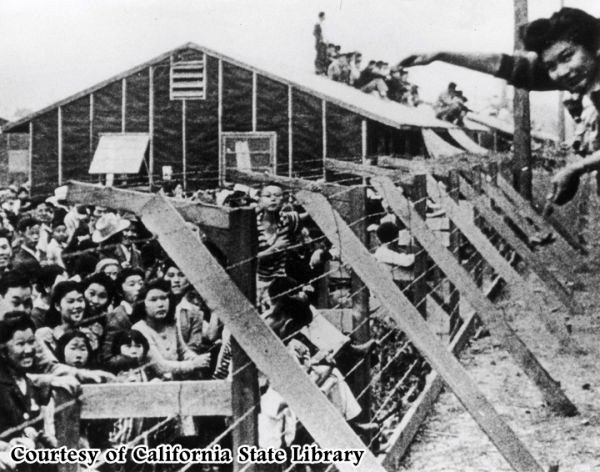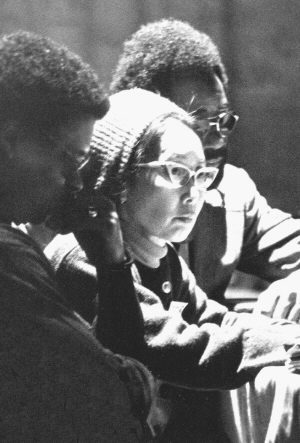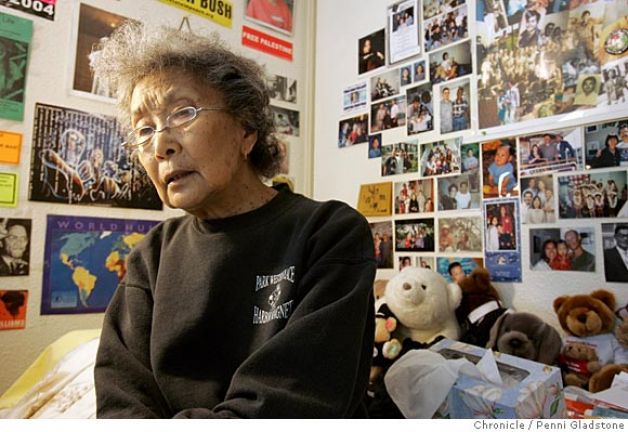On the evening of Sunday, June 1, 2014, the world lost a revolutionary, civil rights activist Yuri Kochiyama. Kochiyama died in her sleep at the age of 93 due to natural causes, according to her family. The Japanese-American figure featured prominently in the political uprisings and movements of the 1960s, fighting for racial justice and equality. Diane C. Fujino, who wrote Kochiyama’s biography Yuri Kochiyama, Heartbeat of Struggle, describes the late activist’s significance by stating, “Most people make life; some people make history. Yuri organized her life around making history. I think of her as a very ordinary person, who’s done extraordinary things.” Let’s celebrate the brilliant way Kochiyama made both life and history.
Kochiyama was born Mary Yuriko Nakahara to Japanese immigrant parents in San Pedro, California. She spent most of her early life growing up in a predominantly white community until the Pearl Harbor bombing in 1941. The United States government began forcefully relocating anyone of Japanese ancestry — whether citizens or immigrants — to internment camps the following year and Kochiyama spent two years at the Jerome Relocation Center in Arkansas. This period of internment and the U.S. government’s human rights violations would inspire Kochiyama’s later activism.

via Tavern Keepers
Kochiyama met her husband, Bill Kochiyama while in the internment camp and the two married after World War II. The two moved to New York City to start a family, and when a larger apartment became available in Manhattanville housing projects, the couple moved themselves and their six children to Harlem. This move brought the Kochiyama’s right into the hotbed of U.S. racial politics and an emerging Black nationalist movement.
Before long, Kochiyama entered the political scene, facilitating and supporting a variety of different political movements. Using her organizing skills, Kochiyama maintained a network for political prisoners once the FBI began arresting civil rights leaders and activists. Kochiyama acted as a point person both for people detained and for those released. Activist Mutulu Shakur reflected that “Anybody getting arrested, no matter black, Puerto Rican, or whatever, our first call was to her number. Her network was like no other.”

via BlackPast.org
Indeed, Kochiyama embodied a spirit of intersectional politics, advocating on behalf of various marginalized and disenfranchised groups. Kochiyama engaged in Black nationalist politics, becoming good friends with leaders like Malcolm X; moreover, when Malcolm X was assassinated at the Audubon Ballroom in 1965, Kochiyama was the first person to run to the slain activist and cradled his head in her lap. Kochiyama supported the struggle for Puerto Rican independence and the release of political prisoners in 1977 by joining a group of Puerto Rican activists who took over the Statue of Liberty and hung the Puerto Rican flag across “Lady Liberty’s” forehead. And, in the 1980s, Kochiyama and her husband fought for government reparations and an official apology for the U.S’ horrific decision to intern people of Japanese decent in the 1940s. Former president Ronald Reagan enacted this apology to former internees by signing into law the Civil Liberties Act in 1988.
After a debilitating stroke in 1997, Kochiyama moved from Harlem to Oakland two years later. Although her health condition forced her to slow down, this civil rights activist held tight to her politics until her last days. Annie Nakao describes the political relics memorialized in Kochiyama’s house:
“… portraits of Death Row inmate Mumia Abu Jamal, assassinated African nationalist and former Congolese Prime Minister Patrice Lumumba and South African anti-apartheid martyr Steve Biko, bumper stickers that proclaim, “Free Palestine” and “Impeach Bush,” and “Police Brutality Didn’t Die on 9-11,” a Che Guevara clock, a poster of “Women of Color Against War,” and, of course, pictures of Malcolm X.”
Even in the decor of her home, Kochiyama demonstrated an intersectional approach to activism, recognizing how the cause of U.S. political prisoners is connected to anti-apartheid struggles, or how Palestinian liberation and an end to police brutality require similar freedom frameworks.

via Can’tStopWon’tStop.com
If you look in the background you can see the political posters on Kochiyama’s walls
Kochiyama fought for an end to Oppression, championing the cause of many different marginalized groups. Although she is known as an Asian American rights activist, Kochiyama embodied a liberation ethic that understood that the uplift of all peoples is necessary for justice and equality. In a 1996 conversation with Angela Davis, Kochiyama insisted, “People in the movements sustain each other because their spirits are so contagious. And we all get hooked.” The passion and dedication with which Kochiyama led her life truly is contagious and galvanizing. Thank you Kochiyama for sustaining and inspiring those of us who benefit today from your devoted activism and work. Rest in peace and rest in power.

Thank you for this beautiful tribute, Helen! Learning about Yuri Kochiyama’s life and work was transformative for me. Everyone should watch her conversation with Angela Davis. I’m so sad to hear of her passing, but her strength and impact continue!
Lovely tribute to a tremendous woman. Thank you for this.
I just stumbled upon her conversation with Angela Davis (the link above) this morning while trying to do some work. I only watched the first few minutes but immediately was so excited by how perfectly relevant it was to what I was working on and how awesome their convo was going to be – I didn’t realize she had died the night before.
I’ll be watching it in the coming days, trying to learn from an amazing woman. Rest in peace.
Beautiful. I wasn’t familiar with her work. Thank you!
Thank you so much for writing this. Yuri Kochiyama was a huge inspiration for me in the awakening of my own political consciousness. May she rest in power.
Thank you for this – what a fascinating and inspiring woman. (I had never heard of Yuri Kochiyama until reading this article.)
What an amazing woman. I’m sorry to say I hadn’t heard about her before this article. Thank you for writing this article.
Thank you for this! A kickass JA activist who looks just like my Bachan – rest in power, indeed.